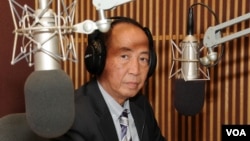FM radio stations in Cambodia began broadcasting foreign-produced content again on Sunday, after the lifting of a government ban in the face of swift international criticism over the weekend.
The ban on broadcasting during the monthlong campaign would have shut down programming from the Voice of America, Radio Free Asia, Radio France International and the Australian Broadcasting Corporation, as more than 9 million registered voters prepare for July 28 elections in a country where media is dominated by Prime Minister Hun Sen’s ruling party.
Officials at the Ministry of Information, which circulated the ban, gave no explanation for lifting it, but they said broadcasts had returned to normal Sunday.
The ban was circulated June 25, but it was not widely reported until Friday. News of the ban brought swift international condemnation, including by the US State Department, the Broadcasting Board of Governors, which oversees US broadcasting, and by the Voice of America and Radio Free Asia. On Facebook, hundreds of users shared news of the ban and criticized the government for issuing it.
The State Department called the ban “a serious infringement on freedom of the press and freedom of expression.”
By Saturday night in Cambodia, national television carried an announcement that the ban was lifted. By Sunday, stations like Beehive Radio, the Women’s Media Center and Angkor Ratha had resumed their broadcasts.
For listeners like Ou Ritthy, who was by his radio listening to VOA Khmer on FM105 in Phnom Penh Sunday night, the return of US broadcasting was a relief.
“Because of VOA and RFA, we learn about the election…and about the political platforms of each party, in detail, through interviews of party leaders,” he said.
Ouk Kimseng, who is overseeing the ministry while Information Minister Khieu Kanharith campaigns for the election, gave no reason for the reversal. “Generally, what has existed is moving normally,” he told VOA Khmer.
That’s good news for voters, said Koul Panha, head of the Committee for Free and Fair Elections, a monitoring group.
“I’d say it’s back to normal,” he told VOA Khmer. “It helps provide voters more information and will also lead the election campaign in a normal environment.”
Broadcast media is overwhelmingly controlled by the ruling Cambodian People’s Party and its supporters, who enjoy continuous coverage of government activities and speeches, while the opposition and smaller parties must rely on a diminished space to broadcast their messages.
Hang Puthea, head of the Neutral and Impartial Committee for Free and Fair Elections, said the ban was probably a “test” for reactions to tighter government controls on media during the campaign. Without a strong reaction, it would have continued, he said.
Listener Tep Bunthy, in Siem Reap, said the US broadcasting provides information on topics from agriculture to democracy. “We learn a lot,” he said.
Mam Sonando, the operator of Beehive Radio, one of only seven stations that carry VOA Khmer content, said the ban proved both the popularity and necessity of foreign programming.
“Because of these stations, people learn, analyze and, particularly, understand clearly about freedom and democracy,” he told VOA Khmer. “The broadcasting of VOA and RFA is really necessary and is the oxygen of the Cambodian people.”
Broadcasts Back on Air After Quick Reversal of Ban
- Sok Khemara
- VOA Khmer

WASHINGTON —



